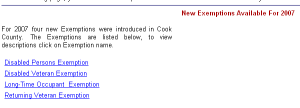Interesting tale of how a lender fired her client for requesting a “double lock” on his refinance (i.e. applying at two lenders and seeing who can get the best rate).
Category Archives: Real Estate-Purchases
Closing volume has nowhere to go but up
The Illinois Association of Realtors keeps real estate closing statistics. Read ‘em and weep…
In the Chicago area, the number of sales, comparing 2006 to 2005, was down about 12%.
The number of sales from 2006 to 2007 was down 20.5%
So far this year, the number of sales is down again from 2008 to 2007:
1st Quarter- 29% down
2d Quarter-33% down
3d Quarter- 22% down
October 08- 17% down
November 08- 32% down
It’s will probably down about 30% for 2008 after you add it all up.
So, basically the real estate market has lopped off close to 60% of its volume compared to 2005 (generally considered the peak).
Wow, I need a drink.
First-time buyer tax credit questions answered
 There is a tax credit of $7500 to first time buyers. This site answers any and every question you might have about who qualifies for the credit and how it works.
There is a tax credit of $7500 to first time buyers. This site answers any and every question you might have about who qualifies for the credit and how it works.
How to create an Illinois Series LLC
A few years ago, Illinois authorized the Series Limited Liability Company (LLC).
A Series LLC is used primarily by real estate investors to hold title to multiple parcels of real estate. This presentation explains how to set up a series LLC in Illinois.
How to check exemptions on Cook Co. Real Estate Taxes
The exemptions on Cook Co. real estate taxes used to be :
1. Homeowner’s exemption;
2. Senior citizen exemption;
3. Senior Freeze.
We just got four more exemptions (disabled, disabled veteran, Long-Term Occupant and Returning Veteran). It used to be hard to understand, now it’s impossible!
If you are considering buying a property in Cook Co. you should know what exemptions are on the property, so that you get the correct tax credit. The easiest way to do this is to look at a copy of the second installment tax bill. Unfortunately, the Cook County Treasurer does not break down the exemptions on their website.
The next best way to check the exemptions is to use the Cook County Assessor’s website. Here is how to do it.
FHA loans are back
FHA loans were largrely abandoned from about 1999-2007. They have made a big comeback and now account for a large part of the mortgage market, especially for first time buyers.
Here’s a good summary of how FHA loans work.
Foreclosure process in IL
Foreclosures used to be rare.
Not any more. They’re everywhere.
This site explains the IL foreclosure process.
Predatory Lending Database
Another layer of administrative hassle has been added to the real estate world. On July 1, 2008, all of Cook County will be subject to the Predatory Lending Database Program. The purpose of this mess of a program is to stop lenders from forcing bad loans on people. (After many years of doing closings, my view is that most people know what they are getting in a bad loan, but sign up for it anyway!)
It works like this: A mortgage document cannot be recorded in Cook County unless a “certificate of compliance” or a “certificate of exemption” is attached to the mortgage. It only applies to owner-occupied, 1-4 unit homes.
This applies to all refinances and all purchases by first-time buyers where any of the following loans are being used: Interest only, negative amortization, more than 5 points being charged, a prepayment penalty or an adjustable of 3 years or less.
If the buyer/refinancer fits this profile, he has to go to counseling (scream therapy may be needed by those sitting through the session) and if it’s determined he really, really still wants the mortgage, the certificate of compliance is issued and then the closing will occur.
The problem is that it’s too much hassle, an extra expense ($100-$200 just for the certificate) and it’s about 2 years too late. Most of the mortgage programs that are targeted here are gone, wiped out by the sub-prime cleansing.
So you want to buy a foreclosure?

So you want to buy a foreclosed house? They are everywhere and everyone and their brother wants to buy one. But are you sure you can bear the pain of buying a foreclosed property?
While the purchase price will be low, buying a foreclosed property is not for the overly picky, the perfectionist or someone who thinks the “customer (i.e. Buyer) is always right.” There are several different categories of foreclosures like “short sales” and buying directly at the sheriff’s sale, but here we are talking about buying a foreclosed property from the lender that foreclosed the loan. These are called REO (Real Estate Owned) properties. I call them a big headache.
Positives
Get a good price.
Usually closes quickly.
No one living in the house to evict.
Negatives
It will take 2-3 weeks to get the Seller to sign the contract.
Can’t schedule home inspection until the contract is signed.
Utilities are turned off when you go to do the inspection.
If property is well and septic, no test is furnished.
Many attorneys handling REO sales do not respond at all—to ANYTHING. Not to the attorney approval letter, the inspection requests or requests of any kind. Multiple calls and emails to get any response from them are the norm. (Codilis and Associates and Pierce and Associates, however, do a great job and respond quickly by email.)
Once you get the utilities turned on and do the inspection, most Sellers will not give you credit for repairs. (Some will give you credits, but only a small percentage.) Just recently, one drew a big X through the attorney approval and inspection letter I sent and faxed it back to me.
No survey will be furnished. You have to buy it.
Usually, the Seller buys title insurance for the buyer, but mot always, so be careful
If you are buying a recently foreclosed condo, under a relatively new Illinois law, you, Mr. Buyer, can get stuck with 6 months of the old foreclosed owner’s condo dues. Nice surprise.
One Chicago area attorney who handles REO closings does not attend closing and fed-x’s the deed to closing. Then he will not sign the closing statement until his client approves it. So you need at least two days to close. Forget it if you want to move in at closing!
If you close “late” you pay a penalty of $100/day or so. If you close more than a few days late you may lose all your earnest money.
How to do it right
Be patient. Don’t buy a foreclosure if it will drive you crazy.
Make the contract subject to attorney’s approval. Many do not have this provision.
Make the contract contingent on your professional home inspection (after the utilities are turned on). If the contract does not allow this, I would not buy the house. It’s that simple.
If the property is well and septic, conduct a well and septic test even if you have to pay for it and make the contract contingent on it passing.
If you are buying a foreclosed condo, ask in the 22.1 disclosure form if there are any back dues owed the association and ask under the attorney approval clause for the Seller to pay all condo dues to date of closing.
Good luck (you’ll need it).
6/4/08: The newest trend: Bank/Seller refuses to “de-winterize” (turn the gas, electric and water back on) making it impossible for the Buyer to do a proper home inspection. Or, worse yet, Bank/Seller forces the Buyer to de-winterize the property, at his or her expense, and makes the Buyer sign a rider taking responsibility if the Buyer wrecks anything in the de-winterizing process.
Cook Co. Homeowner's & Senior exemption forms are here
The Cook County Assessor just put on its website the forms needed to apply for the 2007 homeowner’s exemption, senior exemption and senior freeze (max. income $50,000.00).
The homeowner’s exemption form must be completed by anyone who purchased a house in 2007 or thereafter. Once you file the homeowner’s exemption form, you should not have to do it again. The senior exemption and senior freeze must be filed each year.
Click here to fill out the forms online.
Click here to download and print the forms as a pdf.
